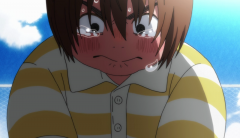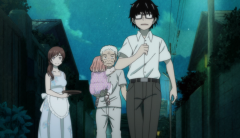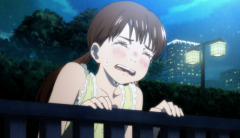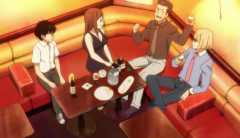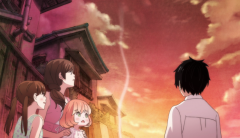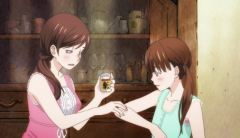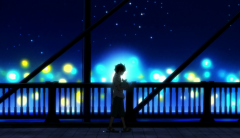Another week, another touching little stories from Rei and his friends. Still follow the same structure as previous 2 weeks, we have the first half of Rei competing against Harunobu, his lifelong rivalry (or so that guy thought), and the remaining half of Rei visiting the three sisters on the last day of Obon festival. Unlike last week where we had the first segment to illustrate Rei’s ordinary professional shogi life, this week’s first section actually has a bit of context behind it. Actually, we have A LOT of context here. We have a whole flashback on the very first time they played together as a kid, narrated by the older Rei now that feel wholeheartedly personal. While the last episode framed Harunobu as a noisy and a bit annoying kid, this week shed a lot of new lights into his characters. He was, and still is, never a match for Rei’s shogi skills, but his determination to fight till the very end is something that feels resonant to Rei. I like how the show keeps cutting back to the flying balloons, and Shaft keeps focus on liquid-dropping motifs (be it big tears that like in manga, sweating, or bubbles on cold drink). The show successfully parallels that kid’s match with the current match in order to show us that the determination, the pure joy of facing off each other would never change, and will continue to be for the rest of their careers. It then turns out that Harunobu has been ill and in the hospital since he was a kid, that adds depth to this characters now that we realize his enthusiasm is not something that easily gained, considering his sickness.
When Rei meets up with the sisters that night, it’s a last day of the Obon festival. On that day, they bid farewell to the deceased ancestors and hope they will be safe in the afterlife. From the look of it I guess the sister’s grandma and mother had been passed away for 2,3 years. Long enough to not overly depressed by it and can carry on the ritual like usual, but soon enough to still feel sad and melancholy. For Rei, he lost his parents from way too long that he eventually shut his emotion off and forget about them in order to carry on. Now I see the connection between him and the sisters and why the sisters treat him like their family. Losing parental figures sure is tough and they eventually share the same pains of losing someone closed to them. But it becomes a habit that when we’re together, we smile and keep looking ahead, and hold that grief feeling to ourselves. That’s why Hinata walks off to the bridge and then outbursts hold so much emotions. She’s always an emotional honest character and carry the weight that burdened on her shoulder is too much for her. At least she can cry her heart out and that is something Rei needs to learn too.
After each viewing, I eventually check out the manga up to where the show had covered to see how closely the adaptation is, and for that Shaft has been followed quite faithfully to the source material. There are many important scenes that they actually adapted literally frame-by-frame from the manga. I previously said that I enjoy the Shaft’s editing for this series, and this episode again show their strengths towards editing: not that smooth editing but quick, sharp cuts to the motifs of the shows: last few weeks we have water bubbling and this week we have quick cuts to the flying balloons or the sun. In addition, there are some Shaft-ness moments that basically remind us this is Shaft’s products. Yes, we have some head tilts and I love to see some Nozomu-sensei imitations here but ultimately, they do it just about enough, without distracting the story. The sound design also deserves a special mention that feel lively, and that soaring scores really bring out the sadness and sorrow without again never really stand out. Great stuffs. Overall, Shaft have been given this show an excellent treatment.
But if I have to compare the manga and the show right now, I feel the manga fare better for me, which is strange because I consider Shaft adapting the manga quite effectively. So why is that? For me, the manga achieves something really simple but direct and honest, and that’s freaking hard to do. Take a scene where Akari explains about the cucumber and eggplant as the “horses” to bring the ancestors to their former homes and backs; while in the anime it feels like she’s giving information for us to process, in the manga I actually feel the sadness behind the talk. Chica Umino is ultimately a character’s writer, as opposed to say Gen Urobochi who famously known for his theme-ridden story and his world-building, or Mari Okada for her heightened drama (I don’t know why I bring up those two honestly, they aren’t even mangaka. Must be Freudian slip). Well, when a mangaka includes the character’s name into the chapters it means that those characters are her privilege and she really cares about her characters. Those characters were given more depth with such honesty that it never feels forced or calculated. I have gotten to the stage where I don’t pretty much care about great plots, shows with deep meaning or profound theme, all I care is characters that feel like real people that I feel invested to, and to witness how they grow overtime. I can safely say that 3-gatsu no Lion achieves that, and that alone is good enough for me to keep recommending this show.

